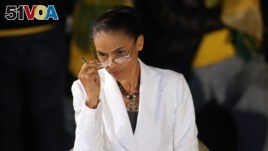05 December, 2017
Former Brazilian senator Marina Silva plans to seek her party's nomination for the presidency next year.
Silva announced her plans at a meeting of her Sustainability Network Party last weekend. The Reuters news agency says the party would officially nominate her as its presidential candidate when at its national convention in April.
The 59-year-old Silva was born in a rubber-producing community in Brazil's Amazon rainforest. She served as the environmental minister under former President Luiz Inacio Lula da Silva. She was a candidate in the past two presidential elections, but never received enough support to compete for a second round vote.

Politician Marina Silva speaks to reporters in Sao Paulo, October 5, 2014. (REUTERS/Nacho Doce)
Silva said she would seek her party's nomination because "Brazilians want a country free of corruption" and that she had the moral values to provide that.
Her supporters have called the environmentalist Brazil's most principled politician.
Since early 2014, Brazilian police and government lawyers have carried out a major anti-corruption campaign. Their efforts have led to discovery of political wrongdoing in every major party, except Silva's.
She has expressed support for financial responsibility, setting targets for inflation and a floating exchange rate.
In a recent survey, Brazilians said Silva was the third most popular candidate, with 10 percent of those questioned saying they would vote for her. The finding was published on the Folha de Sao Paulo newspaper's website last Saturday.
But that survey included Lula as a possible candidate. He was found guilty in a corruption trial in July. If a higher court supports the guilty ruling before the October election, he could not run.
In the 2010 election, Marina Silva, then with the Green Party, won a surprising 20 percent in the first round of presidential voting. But that was not enough to push her into a runoff vote with eventual winner Dilma Rousseff.
In 2014, Silva was the Brazilian Socialist Party's candidate for vice president. The party nominated Eduardo Campos as its presidential candidate. However, he died when his airplane crashed two months before the election. Silva took his place and won 21 percent in the first round. But she again failed to win enough votes for a runoff.
I'm Jonathan Evans.
Anthony Boadle reported this story for the Reuters news agency. Jonathan Evans adapted his report for Learning English. George Grow was the editor.
______________________________________________________________
Words in this Story
convention – n. a large meeting of people who come to a place for usually several days to talk about their shared work or other interests or to make decisions as a group
principled – adj. having, based on, or relating to strong beliefs about what is right and wrong
runoff - n. an additional race, contest, or election that is held because an earlier one has not resulted in a winner
survey – n. an activity in which many people are asked a question or a series of questions in order to gather information about what most people do or think about something